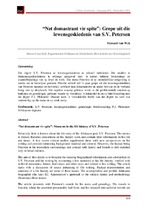“Net domastrant vir spite”: grepe uit die lewensgeskiedenis van S.V. Petersen
Abstract
“Net domastrant vir spite”: Moments in the life history of S.V. Petersen
Relatively little is known about the life story of the Afrikaans poet S.V. Petersen. The entries in literary histories concentrate on his literary work and contain little information on his life and times. A few recent critical studies supplement these with new perspectives on his writing and provide interesting background material and context. However, the human being Petersen in his immediate surroundings and contact with family and friends is still sketched only in broad outlines.
The aim of this article is to broaden the existing biographical information and scholarship on S.V. Petersen and his writing by recounting a few moments in his life history, verified with archival documents, letters, interviews and other texts and related to his writing. The article starts with a discussion of issues pertaining to life writing. Factual representation and narration of a life history are some of these issues. The accomplished and prolific Afrikaans biographer (the late) J.C. Kannemeyer’s approach to his subject matter and methodology illuminates these issues.
The article proceeds with Petersen’s search for his roots and genealogy. His travels to Sweden, where his ancestors presumably hail from, and his research into archival records are highlighted. This forms the basis for a poem like “Suiderkruis” and other texts which deal with his emotions about his ancestry. Other facts about his family life and history are also recounted.
In the following section the articles deals with Petersen’s struggles with the apartheid authorities to resist eviction from his residence in Rondebosch under the Group Areas Act. Anecdotes about the history of the house, e.g. the origin of the name and how he eventually obtained a permit, are retold. A connection is made with Petersen’s love of the pastoral lyric. The views of other critics on this matter are briefly discussed. The section ends with the story of the tragic events that form the basis for the poem “Na die ongeluk”. The last section of the article covers the friendship between Petersen and his friend and fellow poet P.J. Philander. Details of their friendship are uncovered in a number of letters that Petersen wrote to Philander in the late 1970s and early 1980s. This correspondence is held at the University of Stellenbosch Archives. The value of these letters lies in the fact that it shows how one individual witnesses a range of personal and public matters of that particular time. As representative of a particular grouping of coloured intelligentsia this is interesting. It gives insight into the way Petersen perceives the social and political events of this era, e.g. the political patronage and victimisation in the Department of Coloured Affairs. It also gives a view on how Petersen assessed his own writing and his views on colleagues and friends. Of particular importance is the glimpse into his personality and his frail mental condition. His love of travelling is related to aspects of his personality. The article expounds on his purported arrogance and insecurity and balances this with the views expressed in eulogies as well as personal interviews with his son, nephew and his long-time friend Richard van der Ross. The balanced portrayal that Van der Ross gives of Petersen is complemented by comparing it with his own experiences as told in his memoirs. Being those of someone who was a contemporary of Petersen’s and from a similar background, these experiences make interesting reading and shed light on Petersen’s.
From this emerges a nuanced portrait of the poet that will be useful in further studies of Petersen, his life and times and his writing.

